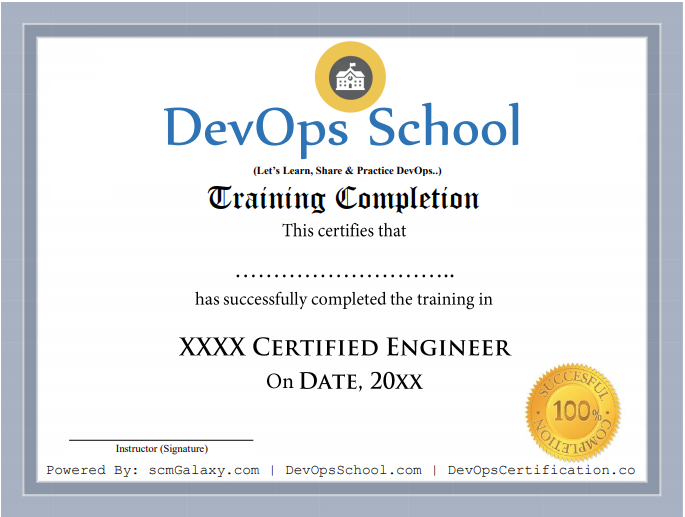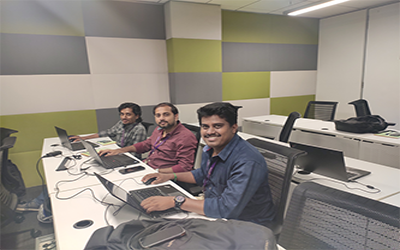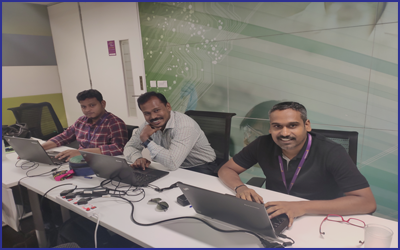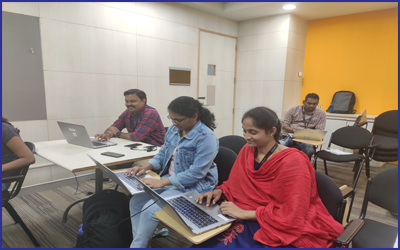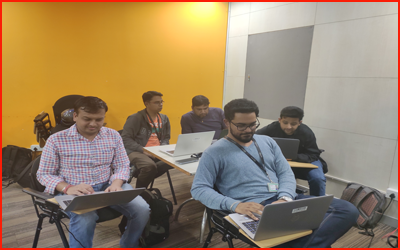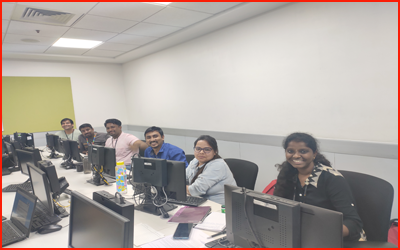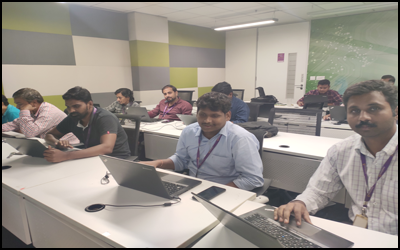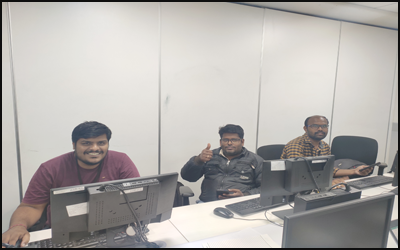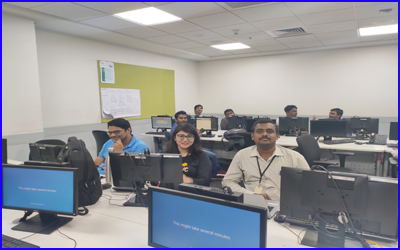8000+
Certified Learners
15+
Years Avg. faculty experience
40+
Happy Clients
4.5/5.0
Average class rating
About Bosun Training
Bosun training refers to the learning programs that help individuals or teams acquire the necessary skills and knowledge to effectively use Bosun, an open-source monitoring and alerting system. Bosun is designed for large-scale infrastructures, allowing organizations to monitor their systems, networks, and applications in real-time. Its flexibility and power make it an essential tool for DevOps and systems administrators. Bosun training is tailored to provide comprehensive education about setting up, configuring, and using Bosun in a production environment. Trainees learn the essentials of defining rules, alerts, metrics, and dashboards to ensure the infrastructure’s smooth operation. The training also includes best practices for troubleshooting, scaling, and maintaining the monitoring environment.
What is Bosun Training?
Bosun training is a structured program aimed at imparting practical and theoretical knowledge regarding the usage and administration of Bosun. It covers various aspects of Bosun, including configuration, alert management, and monitoring strategies. The training program is designed for individuals working in infrastructure management, system monitoring, and performance tuning who need to leverage Bosun’s capabilities to monitor, collect, and act on critical system data. The training often includes a mix of classroom sessions, practical demonstrations, and hands-on labs to enable participants to learn by doing. Additionally, learners gain insights into the architecture of Bosun, how to interact with its various modules, and how to tailor the platform for different organizational needs. Typically, Bosun training is offered to individuals working in systems operations, DevOps, and IT infrastructure roles.
Why Bosun Training is Important?
Bosun is an advanced, open-source monitoring tool designed for managing complex infrastructures. Here are a few reasons why Bosun training is essential:
Here are some of the reasons why Bosun is important:
- Real-Time Monitoring for Large-Scale Infrastructure: In today’s highly distributed environments, ensuring that systems are performing optimally is crucial. Bosun’s ability to handle real-time monitoring of large infrastructure systems makes it indispensable. Proper training ensures that organizations can use Bosun to its full potential for system performance and health monitoring.
- Improved Incident Detection and Response: Monitoring is about more than just tracking metrics; it’s about responding swiftly to issues. With Bosun’s alerting system, organizations can detect issues early and trigger automatic remediation actions. Bosun training helps users understand how to configure effective alerts and notification systems to improve incident response times.
- Optimized System Performance: Without proper monitoring, systems can experience slowdowns, downtime, and even catastrophic failures. Through Bosun training, users learn to fine-tune their systems, avoid unnecessary alerts, and ensure they’re acting on the right data at the right time.
- Reducing Operational Costs: Proper monitoring reduces the time spent on diagnosing problems, allowing teams to be more proactive instead of reactive. Effective Bosun training ensures that users can avoid unnecessary interventions and optimize their workflows, ultimately reducing the overall operational costs.
- Customization and Flexibility: Bosun is highly customizable. Training provides users with the tools to configure Bosun to meet their specific needs, whether it’s creating custom alerts, writing checks, or designing dashboards. This flexibility allows businesses to monitor their environment exactly the way they need to.
Bosun Course Features
Bosun training courses are designed to cover a wide range of topics and provide learners with in-depth knowledge of the platform. The key features of Bosun training courses include:
- Introduction to Bosun’s Architecture: Understanding Bosun’s components, including its scheduler, rule engine, and notification system, is a crucial part of the training. Learners will explore how these components work together to provide scalable and real-time monitoring.
- Alerting and Notification Systems: One of Bosun's most important features is its alerting mechanism. Trainees will learn how to set up various types of alerts and configure notification channels to ensure timely responses to system failures or irregularities.
- Hands-On Labs: Practical exercises play a vital role in Bosun training. Learners will have opportunities to set up Bosun in simulated environments, configure real-time monitoring, write rules, and implement alerts. These labs allow participants to test and apply their learning in real-world scenarios.
- Integrations with Other Tools: Bosun can integrate with several other monitoring and automation tools. Training covers how to connect Bosun with other systems, including databases, cloud platforms, and IT service management tools.
- Dashboards and Visualization: Learners will gain knowledge in creating custom dashboards, visualizing data, and making critical performance metrics more accessible and comprehensible for different stakeholders.
- Scaling and High Availability: Bosun training also addresses best practices for scaling Bosun to handle larger datasets and ensuring the system is highly available. This topic includes clustering and failover strategies.
Bosun Training Objectives
The main objectives of Bosun training are to ensure participants gain a comprehensive understanding of how to deploy, configure, and manage Bosun effectively within their organization. Specific objectives include:
- Mastering the Bosun Architecture: Learners will understand the components that make up Bosun, including data collection, alerting, and notification systems, as well as how these components work together.
- Creating and Managing Alerts: Trainees will learn how to define alert rules, configure thresholds, and integrate notification systems. This will enable them to create an alerting system tailored to the needs of their infrastructure.
- Configuring Dashboards and Visualizations: Participants will become proficient in building and customizing dashboards to monitor key metrics and present data in a user-friendly way.
- Optimizing System Performance: Training will also cover how to optimize Bosun’s performance, prevent alert fatigue, and ensure that alerts are meaningful and actionable.
- Scaling and Deploying Bosun in Production: Learners will be able to scale Bosun to handle large infrastructures, set up high-availability configurations, and troubleshoot common issues in production environments.
- Troubleshooting and Best Practices: Trainees will learn how to diagnose problems in the Bosun system and implement best practices for continuous improvement.
Bosun Target Audience
Bosun training is designed for professionals who work with IT infrastructure, monitoring, and performance management. The primary target audiences include:
- Systems Administrators: Individuals responsible for maintaining and optimizing IT systems can learn how to use Bosun to ensure their infrastructure is healthy and performant.
- DevOps Engineers: DevOps professionals who need to monitor large, distributed environments will benefit from learning how Bosun fits into the DevOps pipeline for continuous monitoring and incident response.
- Site Reliability Engineers (SREs): SREs, who focus on maintaining system uptime and reliability, will benefit from Bosun’s advanced monitoring and alerting features, which help ensure infrastructure is functioning smoothly.
- Infrastructure Engineers: Professionals involved in managing large-scale server infrastructures can use Bosun to track server performance, resource usage, and issues in real time.
- IT Managers and CTOs: Senior professionals who oversee IT teams can gain insight into Bosun’s capabilities, allowing them to manage monitoring systems, set policies, and ensure that systems are operating efficiently.
- Data Engineers: Data professionals responsible for ensuring the health of data pipelines can use Bosun to monitor the performance of the underlying infrastructure that supports those pipelines.
Bosun Training Methodology
Bosun training follows a hands-on, practical approach with a focus on real-world applications. The training methodology generally includes the following components:
- Instructor-Led Sessions: Many Bosun training courses are instructor-led, providing expert guidance on how to deploy, configure, and optimize Bosun. These sessions allow participants to ask questions and interact with the instructor to deepen their understanding.
- Self-Paced Learning: For individuals who prefer learning at their own pace, self-paced modules are available that cover various aspects of Bosun, including setup, configuration, alerting, and troubleshooting.
- Hands-On Labs and Exercises: Bosun training often incorporates hands-on labs and exercises, where learners practice setting up Bosun, defining rules, creating dashboards, and troubleshooting real-time issues.
- Case Studies and Simulations: Some training programs include case studies and real-life scenarios to help learners understand how to apply Bosun in different situations. These are designed to show how Bosun can be used to resolve actual infrastructure problems.
- Group Discussions and Collaborative Learning: Group discussions are often a part of Bosun training to encourage knowledge sharing among peers. Collaborative problem-solving helps reinforce learning and offers a broader perspective on real-world challenges.
Bosun Training Materials
Bosun training typically uses a combination of the following materials to ensure that learners get the most out of their training:
- Course Documentation: A detailed set of documents explaining Bosun’s features, installation guides, and configuration procedures. These documents serve as an essential reference for learners during and after the training.
- Hands-On Labs: Lab guides that allow learners to perform various exercises, such as setting up Bosun in a simulated environment, configuring monitoring rules, and responding to alerts.
- Video Tutorials: Pre-recorded video content that explains key concepts, such as how to configure alerts, integrate with other tools, and troubleshoot issues.
- Case Studies: Real-world examples of organizations using Bosun to monitor their infrastructure. These case studies help learners understand how Bosun can be applied in different scenarios.
- Cheat Sheets and Quick References: Concise reference materials that summarize key Bosun concepts, commands, and configuration options.
- Access to Community Resources: Many training programs offer access to Bosun’s community, including forums, discussion groups, and additional tutorials, where learners can continue their education and ask questions after completing the formal training.
Instructor-led, Live & Interactive Sessions
Duration |
Mode |
Level |
Batches |
Course Price at |
|---|---|---|---|---|
8 to 12 Hrs. (Approx) |
Online (Instructor-led) |
Advance |
Public batch |
24,999/- |
8 to 12 Hrs. (Approx) |
Videos (Self Learning) |
Advance |
Public batch |
4,999/- |
2 Days |
Corporate (Online/Classroom) |
Bosun Training and Certification Course |
Corporate Batch |
Contact US |
Agenda: Bosun Training and Certification Course Download Curriculum
Training methodology
| SL | Method of Training and Assesement | % of Weightage |
|---|---|---|
| 1 | Understanding the problems | 5% |
| 2 | Concept Discussion | 10% |
| 3 | Demo | 25% |
| 4 | Lab & Exercise | 50% |
| 5 | Assessments & Projects | 10% |
OUR COURSE IN COMPARISON
| FEATURES | DEVOPSSCHOOL | OTHERS |
|---|---|---|
| Lifetime Technical Support | ||
| Lifetime LMS access | ||
| Interview Kit | ||
| Training Notes | ||
| Step by Step Web Based Tutorials | ||
| Training Slides |
- The career opportunities for skilled professionals are increasing significantly with huge scope for career growth.
- According to Indeed.com, the average salary of a Bosun professional is $177,530 per annum.
- Bosun being the leading data analytics tool is adopted by many MNCs worldwide. With this, the demand for Bosun professionals is gradually increasing - IDC.com
- IT Operations, IT Monitoring, IT Support, & Data Center teams.
- Business Analysts and Data Analysts who want to gain knowledge of Bosun development for creating Apps and Dashboards
- Understand Bosun concepts
- Apply various techniques to visualize data using multiple graphs and dashboards
- Implement Bosun in the organization to monitor operational intelligence
- Troubleshoot various application log issues using SPL (Search Processing Language)
- Implement indexers, forwarders, deployment servers and deployers in Bosun
- A basic understanding of JavaScript (beginner is fine)
- A basic understanding of Client Side vs Server Side (beginner is fine)
- Professionals seeking a transition to Cybersecurity domain from any background
- Cybersecurity professionals looking to enhance their skillsets
- Enthusiasts looking to enter the exciting world of Cybersecurity
BOSUN CERTIFICATION
What are the benefits of "Bosun" Certification?
Certifications always play a crucial role in any profession. You may find some Bosun professional's, who will tell you that certifications do not hold much value; This certification demonstrates an individual's ability to generate complex searches, reports, and dashboards with Bosun's core software to get the most out of their data.
A Bosun Core Certified User can search, use fields, use look-ups, and create basic statistical reports and dashboards in the Bosun Enterprise or Bosun Cloud Platforms. This certification demonstrates an individual’s ability to navigate and use the Bosun Software.
FREQUENTLY ASKED QUESTIONS
Provide a brief overview of Bosun and its role in business process automation and decision management.
Explain the target audience of the training courses, such as developers, process architects, business analysts, and administrators.
Clarify whether participants need any prior knowledge or skills before taking specific courses.
Describe whether the courses are offered as self-paced online courses, instructor-led workshops, or a combination of both.
Provide information on how participants can register for the courses, including links to registration pages or contact information.
List the key topics and concepts that will be covered in each course.
Explain whether the courses include interactive exercises and real-world examples to reinforce learning.
Mention whether participants will receive course materials, slides, access to platforms, and any other relevant resources.
Specify if the completion of a course leads to a certification, and provide details about the certification process.
Explain whether participants will have continued access to course materials and resources after completing the course.
Provide an estimated duration for each course to help participants plan their schedules.
Mention if there are options for group bookings or customized training programs for organizations.
Provide information on payment methods, pricing, and any available discounts.
Explain if participants will have access to technical support or assistance during the course.
Provide contact information or links to reach out for inquiries and questions about the training courses.
DEVOPS ONLINE TRAINING REVIEWS

Abhinav Gupta, Pune
(5.0)The training was very useful and interactive. Rajesh helped develop the confidence of all.

Indrayani, India
(5.0)Rajesh is very good trainer. Rajesh was able to resolve our queries and question effectively. We really liked the hands-on examples covered during this training program.

Ravi Daur , Noida
(5.0)Good training session about basic Devops concepts. Working session were also good, howeverproper query resolution was sometimes missed, maybe due to time constraint.

Sumit Kulkarni, Software Engineer
(5.0)Very well organized training, helped a lot to understand the DevOps concept and detailed related to various tools.Very helpful

Vinayakumar, Project Manager, Bangalore
(5.0)Thanks Rajesh, Training was good, Appreciate the knowledge you poses and displayed in the training.

Abhinav Gupta, Pune
(5.0)The training with DevOpsSchool was a good experience. Rajesh was very helping and clear with concepts. The only suggestion is to improve the course content.


